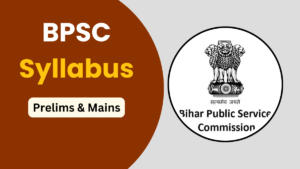Table of Contents
Delhi Judiciary Syllabus 2025 will be released soon on the official website of the Delhi High Court. Candidates can check the preliminary and main exam syllabus after the release of the official syllabus pdf at delhihighcourt.nic.in. Candidates should check the Delhi Judiciary Syllabus and Exam Pattern related to Preliminary and Main Exams before appearing for the exam. Candidates can get detailed information about this syllabus from the given article.
Delhi Judiciary Syllabus 2025
The Delhi Judiciary Syllabus consists of three main stages: Preliminary, Mains, and Viva Voice Examinations. The Preliminary Exam includes various types of topics has been covered like General Knowledge, Current Affairs, English Language, and fundamental legal topics. On the other hand, The Mains exam covers topics like Civil and Criminal Law, including contract law, family law, and criminal procedure.
Delhi Judiciary Syllabus 2025 Preliminary Exam
The first phase of the Delhi Judiciary syllabus 2025 is the Preliminary Exam, a qualifying screening test with multiple-choice questions. It tests your understanding of legal concepts, English proficiency, and ability to solve objective legal issues. Here are the subjects you need to study for the Prelims Paper:
- The Constitution of India
- The Code of Civil Procedure, 1908
- The Code of Criminal Procedure 1973
- The Indian Penal Code
- The Indian Contract Act of 1872
- The Limited Liability Partnership Act 2008
- The Arbitration and Conciliation Act 1996
- The Indian Evidence Act of 1872
- The Specific Relief Act of 1963
- The Limitation Act of 1963
- The Protection of Children from Sexual Offences Act, 2012
- The Commercial Courts Act, 2015
Delhi Judiciary Syllabus 2025 Mains Exam
After conducting the preliminary exam, the shortlisting candidates will go for the main exam. Before appearing for the mains exam, candidates should check the Delhi Judiciary Syllabus for the mains which was released on the official website of Delhi High Court. Candidates can get information about Delhi Judiciary Exam Mains, which is the second part of the exam, here. This is a written exam where you can score a total of 850 marks. Delhi Judiciary Main Syllabus consists of four papers, and each paper covers various topics.
- General Legal Knowledge & Language
- Civil Law I
- Civil Law II
- Criminal Law
General Legal Knowledge & Language
Section 1- General Knowledge
The questions in this section aim to assess your understanding of recent legal developments and events.
Section 2 – Language (Essay, Translation, and Precis Writing)
- The Delhi Judiciary Exam Language Paper (English) evaluates your English language skills.
- It assesses your ability to clearly and effectively understand and express ideas.
- This paper includes two passages, one in English and one in Hindi, for translation.
- You must translate the English passage into Hindi using Devnagri Script and the Hindi passage into English.
- It’s crucial to focus on both content and expression for a high score in this section.
- Accurate translations and effective expression are rewarded with credit, but errors in grammar, vocabulary, and sentence structure may result in point deductions.
- The Language Paper is a vital part of the Delhi Judiciary Exam and demands thorough preparation.
Civil Law I
In this paper of 200 marks, the questions are based on the following topics:
- The Indian Contract Act of 1872
- The Sale of Goods Act of 1930
- The Transfer of Property Act, 1882
- The Specific Relief Act of 1963
- Hindu Law
- Mohammedan Law
- The Delhi Rent Control Act of 1958
- Law of Torts
- The New Delhi Municipal Council Act of 1994
- The Delhi Municipal Corporation Act of 1957
- The Commercial Courts Act of 2015
Civil Law II
The Civil Law Paper Two is worth 200 marks, and it covers questions related to the following topics:
- The Code of Civil Procedure, 1908
- The Indian Evidence Act of 1872
- The Limitation Act of 1963
- The Registration Act of 1908
- The Arbitration and Conciliation Act, 1996
- The Trade Marks Act, 1999
- The Copyright Act of 1957
Criminal Law
In the criminal law paper, your knowledge and understanding will be assessed in the following areas:
- The Code of Criminal Procedure, 1973
- The Indian Penal Code
- The Indian Evidence Act of 1872
- The Protection of Women from Domestic Violence Act, 2005
- The Negotiable Instruments Act of 1881
- The Sexual Harassment of Women at Workplace (Prevention, Prohibition and Redressal) Act, 2013
- The Juvenile Justice (Care and Protection of Children) Act, 2015
Delhi Judiciary Syllabus 2025 Vice Voce
After conducting the Mains Exam, Shortlisted candidates from the mains exam will go for a Vivo Voce. Before appearing for the viva voce Candidates should check the Delhi Judiciary Syllabus Vice Voce from the given article.
- The Viva-voce is the final stage of the Delhi Judiciary Exam.
- It evaluates your understanding of current legal affairs and the legal system.
- Your communication skills, reasoning ability, and personality traits may also be assessed.
- Examiners will inquire about your legal knowledge and how you apply it to practical situations.
- General category candidates need at least 50% marks in viva voce for recommendation to the Delhi Judiciary Service.
- Reserved category candidates require a minimum of 45% marks for final selection.
- The final merit list is determined by combining marks from the main examination and viva voce.
Delhi Judiciary Syllabus 2025 Download PDF
The Delhi Judiciary Syllabus PDF is an essential resource for candidates preparing for the Delhi Judicial Services Examination. It covers subjects like civil law, criminal law, procedural laws, and general knowledge for the Preliminary, Mains, and Viva Voice exams. All applicants should download the syllabus PDF to plan their preparation and focus on important topics for success.
Delhi Judiciary Exam Pattern
The Delhi Judicial Exam for 2025 will comprise three Stages: the Preliminary examination, the Mains examination, and the Viva Voce. A comprehensive overview of the Delhi Judicial Services Exam pattern is presented below:
Preliminary Exam Pattern
- Delhi Judiciary Service Examination is conducted in offline mode.
- Delhi Judicial Services Prelims exam time duration is 2 hours
- The paper will be an objective type of paper for a total of 200 marks.
- For every wrong answer, 25% marks will be deducted.
| Sl. No | Subjects | Total marks | Duration |
| 1 | General Knowledge |
200 marks
|
2 hours
|
| 2 | Current Affairs | ||
| 3 | English Language | ||
| 4 | Constitution of India | ||
| 5 | Acts |
Mains Exam Pattern
The Delhi Judicial Services Mains Exam consists of four exams.
| Papers | Description | Maximum Marks | Duration |
| Paper I | General Knowledge & language | 250 | 3 hours |
| Paper II | Law-I | 200 | 3 hours |
| Paper III | Law-II | 200 | 3 hours |
| Paper IV | Law-III | 200 | 3 hours |
Delhi Judiciary Previous Year Question Paper
Delhi Judiciary Previous Year Question Papers are valuable tools for exam preparation. They help you understand the type of questions, key topics, and important court cases. Practicing with these papers improves your answering skills and boosts your confidence, ensuring you are well-prepared for the real exam. They are essential for anyone aiming to become a judge.
Delhi Judiciary Syllabus 2025 Preparation Tips
Preparing for the Delhi Judiciary examination is a rigorous process that requires dedication, thoroughness, and strategic planning. Here are some preparation tips to help you succeed in your Delhi Judiciary exam:
- Understand the Exam Pattern: Familiarize yourself with the examination pattern, including the number of papers, the marking scheme, and the syllabus. Typically, the Delhi Judiciary exam consists of two stages: the Preliminary exam and the Main exam, followed by a Viva-Voce or Interview.
- Syllabus Analysis: Carefully analyze the syllabus to identify the specific topics and subjects you need to cover. Make a comprehensive study plan that covers all areas.
- Study Material: Gather the recommended study materials such as law books, legal journals, bare acts, and previous year question papers. Consult both standard textbooks and online resources.
- Create a Study Schedule: Develop a well-structured study schedule that allocates time for each subject or topic. Make sure to include time for revisions and practice tests.
- Case Law Analysis: Case laws are crucial for judicial exams. Regularly read and analyze landmark judgments relevant to the syllabus. Understand the facts, issues, and legal principles involved in these cases.
- Take Mock Tests: Practicing mock tests and previous year question papers will help you understand the exam pattern and improve time management skills. Analyze your performance and work on your weak areas.
- Legal Maxims and Latin Terms: Memorize important legal maxims and Latin terms as they are frequently asked in judicial exams.
- Focus on Current Affairs: Stay updated with current legal developments, news, and important legislation. Current affairs questions are often included in the Preliminary exam.
- Answer Writing Practice: Develop your answer writing skills for the Main exam. Write clear, concise, and structured answers that demonstrate your understanding of the law. Use relevant case laws and statutory provisions to support your arguments.
- Viva-Voce Preparation: If you qualify for the Viva-Voce, practice mock interviews and engage in discussions on legal topics to improve your communication and presentation skills.
- Legal Research: Enhance your legal research skills, as they are crucial for both the Main exam and practical aspects of being a judge. Know how to find relevant case laws and legal authorities.
- Consistency is Key: Consistent, daily study habits are more effective than cramming. It’s essential to study regularly and revise what you’ve learned.
- Seek Guidance: If you have doubts or need clarification, don’t hesitate to consult experienced mentors, teachers, or legal experts. They can provide valuable guidance.
- Stay Motivated: Preparing for the judiciary exam can be challenging, but maintaining a positive attitude and staying motivated is crucial. Set achievable goals and remind yourself of your long-term objectives.
Remember that success in the Delhi Judiciary examination requires persistent effort and a deep understanding of the legal subjects. Stay focused, stay disciplined, and stay committed to your preparation.
| Delhi Judiciary related articles | |
| Delhi Judiciary Syllabus | Delhi Judiciary Eligibility |
| Delhi Judiciary Question Paper | Delhi Judiciary Salary |



 APSC Syllabus 2025, Download Prelims And...
APSC Syllabus 2025, Download Prelims And...
 Punjab PCS Syllabus 2025, New Prelims an...
Punjab PCS Syllabus 2025, New Prelims an...
 BPSC Syllabus 2025 and Exam Pattern For ...
BPSC Syllabus 2025 and Exam Pattern For ...
